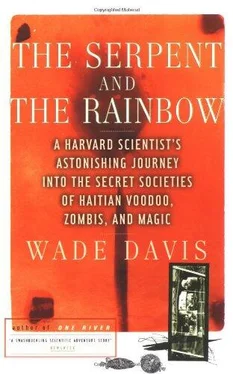Wade Davis - The Serpent and the Rainbow
Здесь есть возможность читать онлайн «Wade Davis - The Serpent and the Rainbow» весь текст электронной книги совершенно бесплатно (целиком полную версию без сокращений). В некоторых случаях можно слушать аудио, скачать через торрент в формате fb2 и присутствует краткое содержание. Год выпуска: 1985, Издательство: Simon & Schuster, Жанр: Старинная литература, на английском языке. Описание произведения, (предисловие) а так же отзывы посетителей доступны на портале библиотеки ЛибКат.
- Название:The Serpent and the Rainbow
- Автор:
- Издательство:Simon & Schuster
- Жанр:
- Год:1985
- ISBN:нет данных
- Рейтинг книги:5 / 5. Голосов: 1
-
Избранное:Добавить в избранное
- Отзывы:
-
Ваша оценка:
- 100
- 1
- 2
- 3
- 4
- 5
The Serpent and the Rainbow: краткое содержание, описание и аннотация
Предлагаем к чтению аннотацию, описание, краткое содержание или предисловие (зависит от того, что написал сам автор книги «The Serpent and the Rainbow»). Если вы не нашли необходимую информацию о книге — напишите в комментариях, мы постараемся отыскать её.
The Serpent and the Rainbow — читать онлайн бесплатно полную книгу (весь текст) целиком
Ниже представлен текст книги, разбитый по страницам. Система сохранения места последней прочитанной страницы, позволяет с удобством читать онлайн бесплатно книгу «The Serpent and the Rainbow», без необходимости каждый раз заново искать на чём Вы остановились. Поставьте закладку, и сможете в любой момент перейти на страницу, на которой закончили чтение.
Интервал:
Закладка:
They seemed stunned. There was a quiver. Then everybody stiffened and held their breath for a silent minute. Some perhaps thought of the money, others may have weighed the insult. Marcel said nothing.
“So you think about that,” I said, “and I will be back in the morning.” At that Max Beauvoir and I walked out of the hounfour, slowly pushing our way through Marcel’s women like men fording a river.
The next morning Marcel greeted Rachel and me at the entrance to his hounfour and invited us into the bagi. It was a small chamber—I could touch a wall in every direction. The air smelled of old newspapers, candle smoke, and earth. Marcel flung open the shutter of the single window, and a shaft of limpid light fell on the altar, turning the colored bottles into jewels. Then he knelt, working a toothpick busily along his gleaming jaw. From beside the altar he lifted a rum bottle and held it to the light. He passed it to me, his gesture a challenge. The bottle was filled with seeds, wood, and other organic debris. The smell was acrid, like rotting garlic. There is an adage in Haiti that warns one never to partake of an open bottle in an unknown temple. I took a drink.
Marcel began to laugh and turned to Rachel incredulously. “How did he know there was nothing in it?”
“He didn’t,” she replied.
Now Marcel was dumbfounded. “Why is this blanc not afraid of me?”
“Because he is afraid of no man,” she said flatly. I glanced at her. Though a lie, it was the perfect answer.
At that moment my relationship with Marcel Pierre changed. As we quit the temple I noticed what would turn out to be ingredients of the proper zombi poison drying on the clothesline. Just before we reached our jeep, Marcel mentioned something to Rachel. She turned to me uneasily. “He wants you to return tonight alone. He says it is time to get the poison.”
There was no moon, and the clouds blocked the stars. A tremendous thunderstorm had cracked open the dusk sky. Now, shortly after midnight, by the roadside several miles north of Saint Marc, the dark clouds remained menacingly on the horizon.
There were five of us—Marcel, myself, his assistant Jean, and two of his women. We left the road on foot and followed a narrow trail that crisscrossed up an eroded draw, weaving through spindly, brittle vegetation. Here, it was pitch-dark. There was one flashlight, but its fading light was of little use. Marcel carried it in front, stumbling and laughing in a morbid glee thoroughly seeped in rum. Behind him came Matilde, her long white dress running behind her in waves as she walked. I followed, and the other woman, Marie, took my hand. It wasn’t very helpful, for in the darkness she was as clumsy as I, yet I appreciated the human contact. Jean was the last, and he seemed to have night vision. He moved slowly, steadily up the draw, his senses keen, taking in every sound or movement. Slung over his shoulder were a shovel and a pick.
On a dry knoll, with the hills all around like a finely placed shroud, the air tasted damp and decayed. The rain was coming. Sheet lightning flashed in bursts of distant light that revealed shadows on Marcel’s face. In his dark glasses, worn by night as well as day, I saw reflections of the two women—Marie in red, Matilde in white, her dark skin glowing out of all that white cloth. Far below, the headlights of passing cars and trucks skimmed the roofs of the hamlet. The people there were asleep, while we were about to steal one of their dead.
The tomb was unmarked, just a slight rise in the soil. Jean slipped away to contact a confederate he had in the community. We waited, staying low, our arms linked gently. The silence strained my ears. I felt a flush of fever and fought off the spasms. Jean returned after twenty minutes, panting, his eyes shining, his lips preserving silence. Marcel handed him a couple of cigarettes, and Jean carried them into the shadows to the confederate. When Jean struck a match, the bold light momentarily flooded their faces.
The shovel didn’t dig, it scraped the compacted soil from the grave. The pick broke it off in lumps. Deeper and deeper, and from behind the muffled laughter of the women, like the distant cackle of ravens on the coast at the end of day. From the grave the strong, distinct smell of moist earth.
I held the torch and followed the progress in its narrow beam of light. Some four feet down, the blade of the shovel tore into the reed mat that lined the recesses of the tomb. Beneath the mat were several layers of cotton cloth, the brilliant colors scarcely faded. Then came the hollow thud of steel upon a wooden casket. Jean stopped to cover his face with a red cloth and rub a liniment on all exposed parts of his body. We did the same. Marcel came forward and had us inhale a viscid potion that smelled of ammonia. Cautiously Jean scraped the loose dirt from around the coffin. Leaning as far away from the grave as possible, he reached one arm into the ground and with the pick attempted to pry the coffin from the base of the tomb. The coffin splintered. He stopped, and dug some more with the spade. Finally he crept into the grave, tied a rope to one end of the coffin and hoisted it out of the ground.
It was short, a mere three feet long. Jean cracked the edge of a narrow plank. It took some time for my eyes to grow accustomed to the color of dust and death. Then I felt the horror. I saw a small shrunken head, lips drawn back over tiny yellow teeth, eyes squinting in toward each other. It was a child, a baby girl, her bonnet intact, stiff and gray-brown. As Jean and Marcel carefully placed a large hemp sack over the coffin, I wandered from coffin to tomb. Like a wound, the gaping hole drew me back in strange fascination. Matilde stayed close beside me, stopping me once to wipe my damp brow with the fringe of her skirt. I was dismayed. Bodies decompse rapidly in such a climate: this child could not have been in the grave a month. Jean lifted the coffin onto his head and began to walk down the draw. The others went with him. I came last, following the sugary movements of a whore’s hips.
No one paid much attention to us as we unloaded the coffin in front of the Eagle Bar. A few clients leaned over the concrete railing, but the music covered our voices. Jean took the coffin out of the back of the jeep and carried it around to Marcel’s bagi. Marcel ordered soft drinks. I bought a couple bottles of rum. I had a few drinks with him, and as I left, I heard Jean working the shovel behind me, burying the coffin in the court of the hounfour. There it would remain until I returned.
Thus we had collected the first and, according to Marcel, most important ingredient of the zombi poison.
I drove south swiftly, my headlights stripping off the final layers of the Haitian night. Beneath the steep slopes that reach the sea near Carrius, with daybreak coming, the pastel sky brightened and luminous clouds revealed great gaps in the sky. Streamers of brilliant light backlit the mountains. Impulsively I made for the sea. Along a pure and virgin shoreline, I felt an irresistible desire to bathe. I shed my clothes on a beach above a fishing village and waded out into the chilling waters. Shapes began to emerge with the dawn—across the water, the shimmering reflections of distant coral atolls, and south along the beach, toward the settlement, the glistening black bodies, piratelike, shouting morning songs. I was glad to be cold. Then I felt the warm breeze fall off the land and caress my cheek. I remembered something the stranger at the Ollofson had said: “Haiti will teach you that good and evil are one. We never confuse them, nor do we keep them apart.”
Three days later Marcel led Rachel and me up a broken tract, past a wattle-and-daub house where an ancient woman lived alone, to a draw that opened on a grim wash studded with cacti and brush. Jean was with us, and he and one other assistant carried a metal grill, a cloth sack, and a mortar and pestle. Marcel had a vinyl briefcase, splitting at the seam. We stopped when we reached a small flat, partially shaded by a massive stand of caotchu , a wretched succulent with contorted limbs and a viral look. Like everything else in this wasteland, it was sharp and pointed and had sap that burned.
Читать дальшеИнтервал:
Закладка:
Похожие книги на «The Serpent and the Rainbow»
Представляем Вашему вниманию похожие книги на «The Serpent and the Rainbow» списком для выбора. Мы отобрали схожую по названию и смыслу литературу в надежде предоставить читателям больше вариантов отыскать новые, интересные, ещё непрочитанные произведения.
Обсуждение, отзывы о книге «The Serpent and the Rainbow» и просто собственные мнения читателей. Оставьте ваши комментарии, напишите, что Вы думаете о произведении, его смысле или главных героях. Укажите что конкретно понравилось, а что нет, и почему Вы так считаете.












